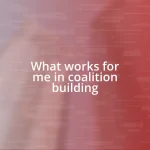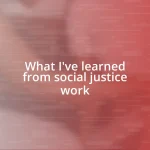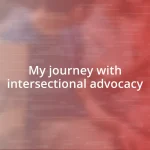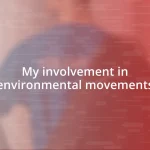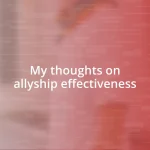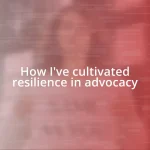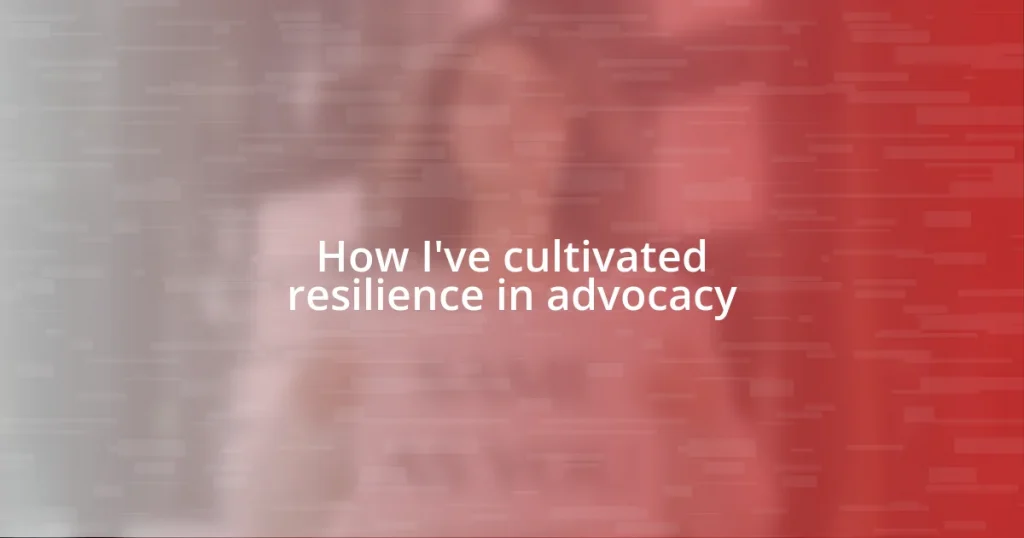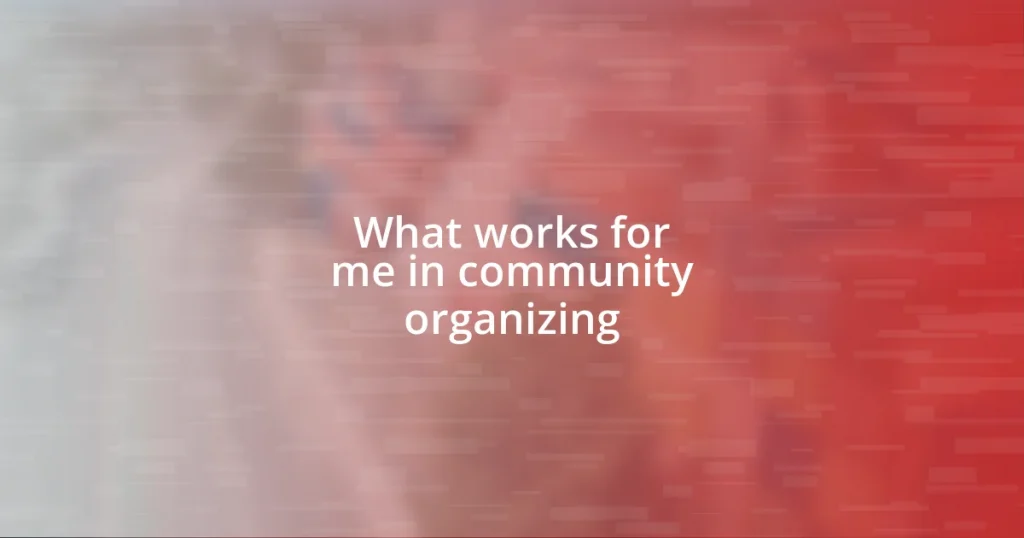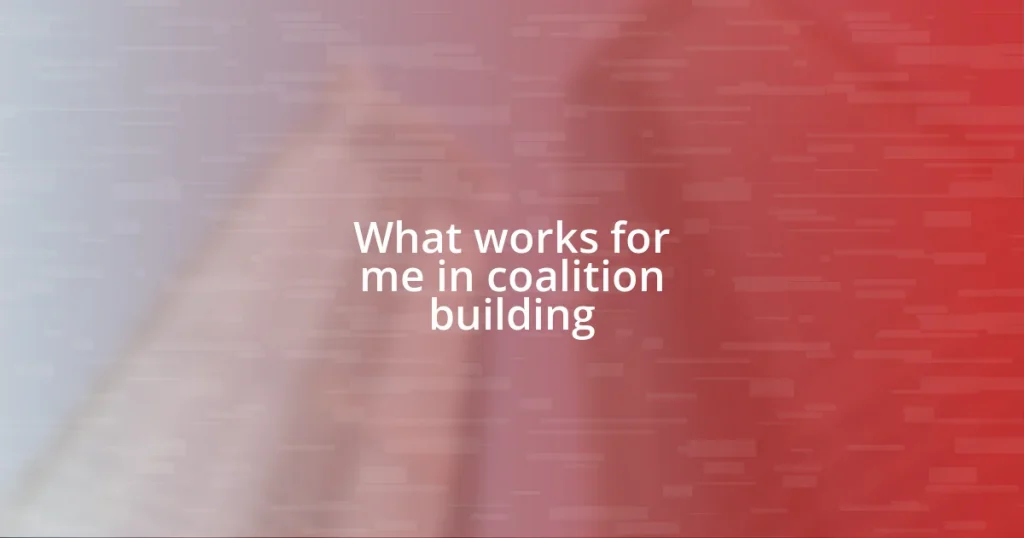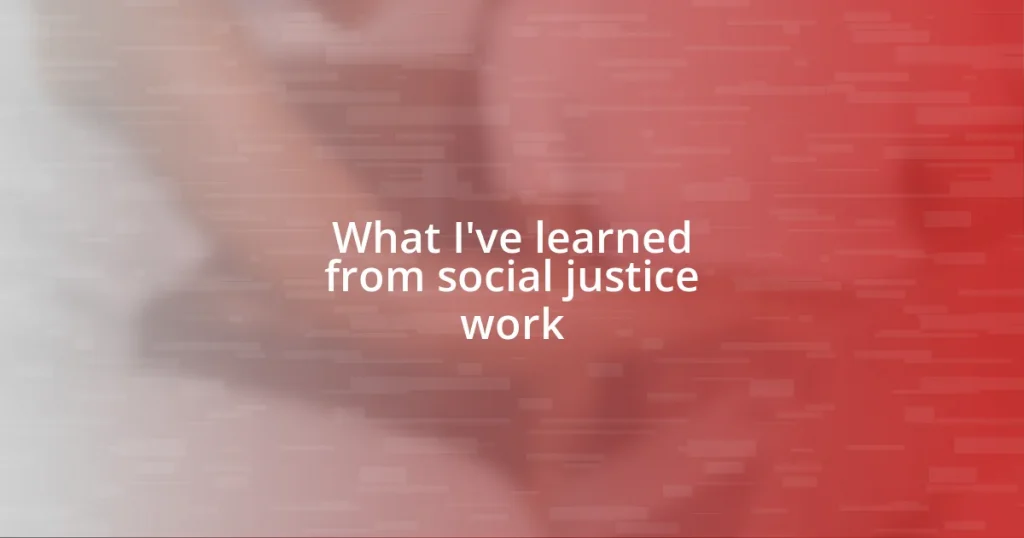Key takeaways:
- Personal resilience stems from a deep connection to core values and is strengthened through vulnerability, allowing for mutual support in challenging times.
- Building self-awareness enhances communication in advocacy by recognizing emotional triggers and seeking feedback, leading to more effective interactions.
- Maintaining motivation involves setting achievable goals, celebrating small victories, and prioritizing self-care to prevent burnout and sustain long-term passion.
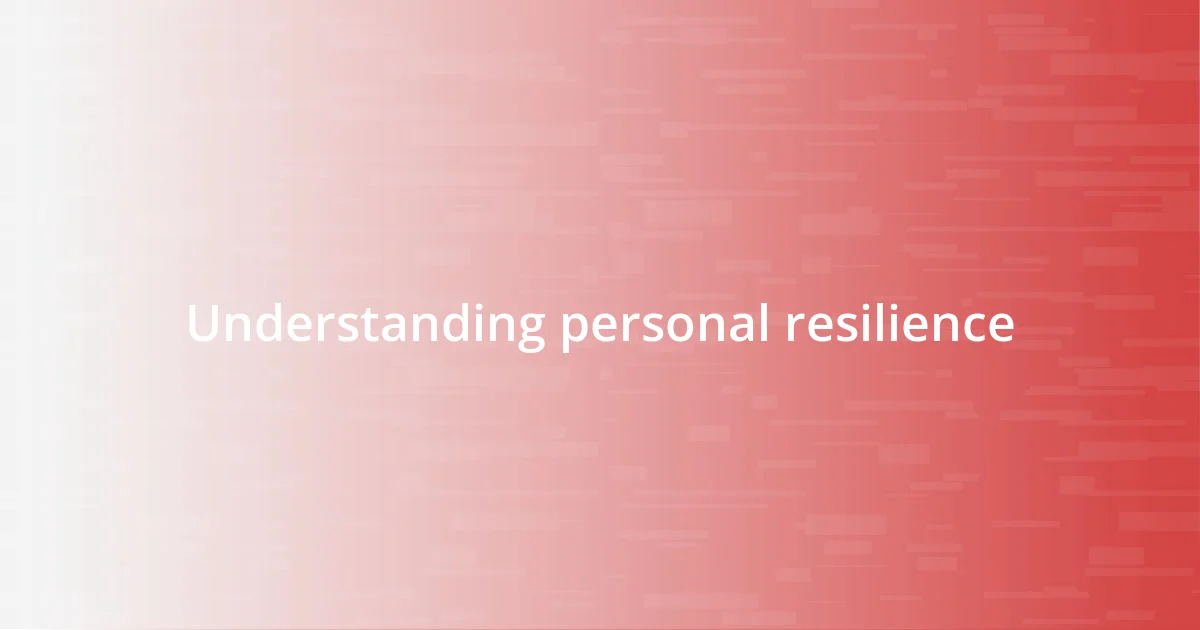
Understanding personal resilience
Personal resilience is about bouncing back from challenges, and I’ve learned firsthand that it often requires a deep connection to one’s core values. I remember facing intense opposition during a campaign I passionately believed in. In those moments, reflecting on why I started kept me grounded, helping me navigate the storm with a clearer mind.
During this journey, I realized that resilience is also intertwined with vulnerability. I once shared my struggles openly in a community meeting, which surprised me; instead of diminishing my credibility, it fostered deeper connections. Have you ever found that sharing your toughest moments actually strengthens your resolve? I now understand that personal resilience isn’t just about standing tall but also about leaning on others when the weight feels too heavy.
Building resilience means actively nurturing a positive mindset. I often remind myself that setbacks are not failures; they’re opportunities for growth. The question I ask is, what can I learn from this? This shift in perspective has empowered me to face difficulties with a sense of curiosity rather than fear.
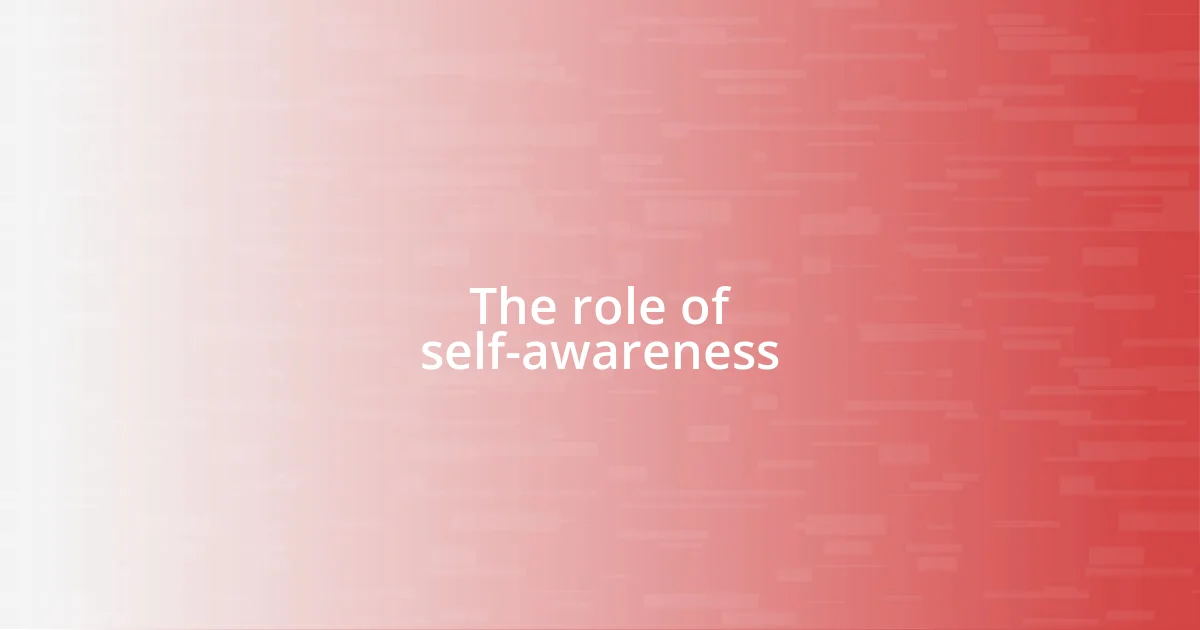
The role of self-awareness
Self-awareness serves as the foundation for my advocacy efforts, acting as a mirror that reflects my strengths and areas for improvement. I recall a time when I was navigating a contentious debate; my ability to pause and assess my emotions before responding allowed me to maintain composure. In those tense moments, recognizing my frustration transformed it into a tool for empathy, enabling me to connect with opposing views rather than react defensively.
Understanding oneself can vastly enhance communication and effectiveness in advocacy. Here are some elements I focus on to deepen my self-awareness:
- Emotional Check-Ins: Regularly evaluating my emotional state helps me understand my triggers and motivations.
- Journaling: Writing down my thoughts and feelings provides clarity and insight into my experiences.
- Feedback Seeking: Requesting honest feedback from trusted peers allows me to see myself from different perspectives and identify blind spots.
- Mindfulness Practices: Engaging in mindfulness keeps me present, reducing impulsivity in advocacy situations.
By embracing self-awareness, I’m better equipped to navigate the complexities of advocacy with intention and growth.
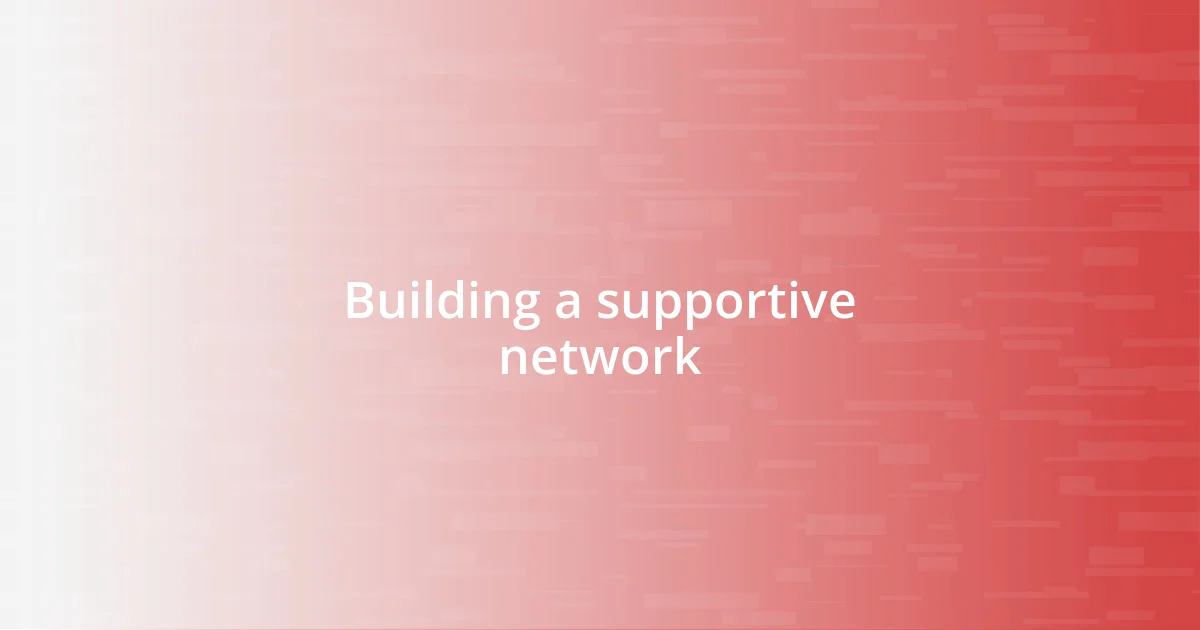
Building a supportive network
Building a supportive network has become my lifeline in advocacy. I remember attending a local advocacy seminar where I met a group of passionate individuals who shared my goals. We formed a small circle where we brainstormed ideas and offered each other feedback. That experience taught me the importance of surrounding myself with people who inspire and uplift me. Having a reliable support system makes challenges feel lighter, doesn’t it?
In my journey, I realized that my network isn’t just a group of acquaintances—it’s a community. I make it a point to check in regularly with my peers, whether through casual coffee chats or structured brainstorming sessions. The emotional support I gain from these interactions is invaluable; we share our highs and lows, transforming them into valuable lessons. It’s incredible how everyone brings a different perspective, which ultimately enriches our collective advocacy work.
The energy in a supportive network can be transformative. I’ve witnessed how collaboration breeds resilience. For example, during a particularly challenging project, our group pooled our resources and strengths, creating a well-rounded approach that I couldn’t have achieved alone. This collaboration not only helped us succeed but bolstered my resilience, reminding me that together, we can navigate even the roughest waters. Building such relationships is crucial, as they provide both emotional strength and practical assistance when the going gets tough.
| Reasons to Build a Supportive Network | Benefits of a Supportive Network |
|---|---|
| Emotional Strength | Improved Resilience |
| Varied Perspectives | Enhanced Creativity |
| Resource Sharing | Increased Efficiency |
| Encouragement | Motivation to Persist |
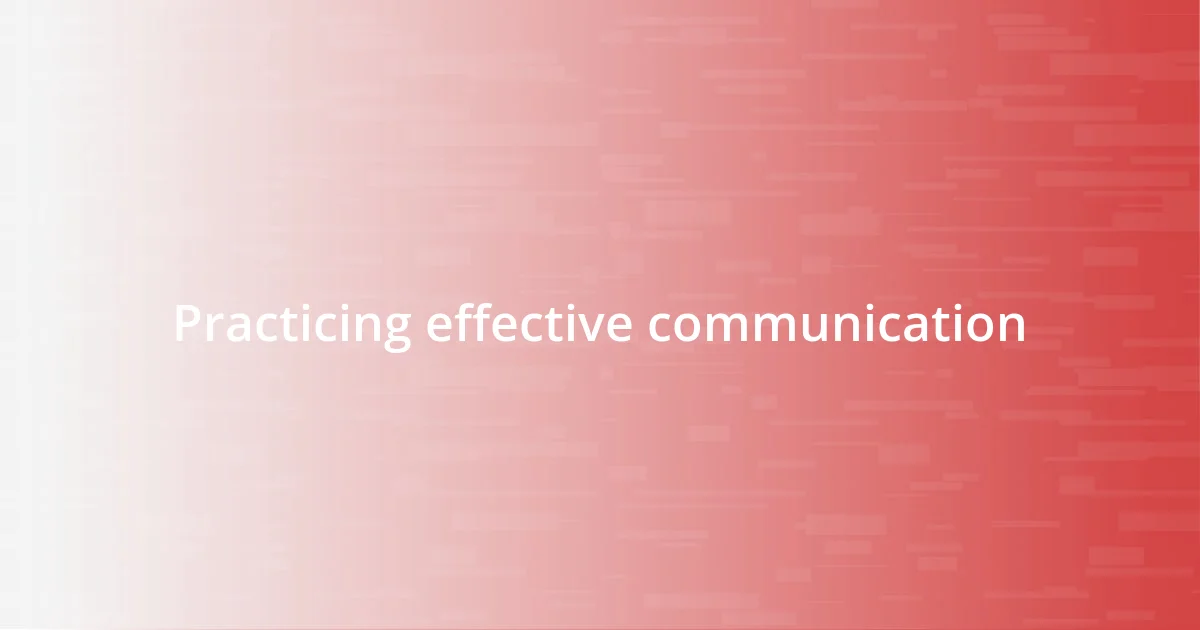
Practicing effective communication
Effective communication is an essential skill for any advocate. I recall a moment during a heated discussion where my choice of words became a bridge rather than a barrier. Instead of pushing my agenda, I actively listened, which opened up a space for dialogue. It’s fascinating how sometimes, saying less can achieve so much more.
One technique that I’ve found particularly useful is mirroring language. By reflecting back the words and emotions of those I’m communicating with, I create a deeper connection. Imagine how it feels to be truly heard! This practice not only affirms the other person’s feelings but also encourages them to engage more openly. I’ve seen shifts happen in conversations just by taking a moment to validate someone’s perspective first.
Moreover, clarity is key in advocacy. When I convey my message, I strive for precision, avoiding jargon that might alienate my audience. There was a time I was explaining a complex policy issue, and simplifying it not only made it accessible but also sparked curiosity. I always ask myself: Are my words fostering understanding or confusion? By focusing on clarity, I empower others to engage with the subject matter, making the conversation more fruitful for everyone involved.
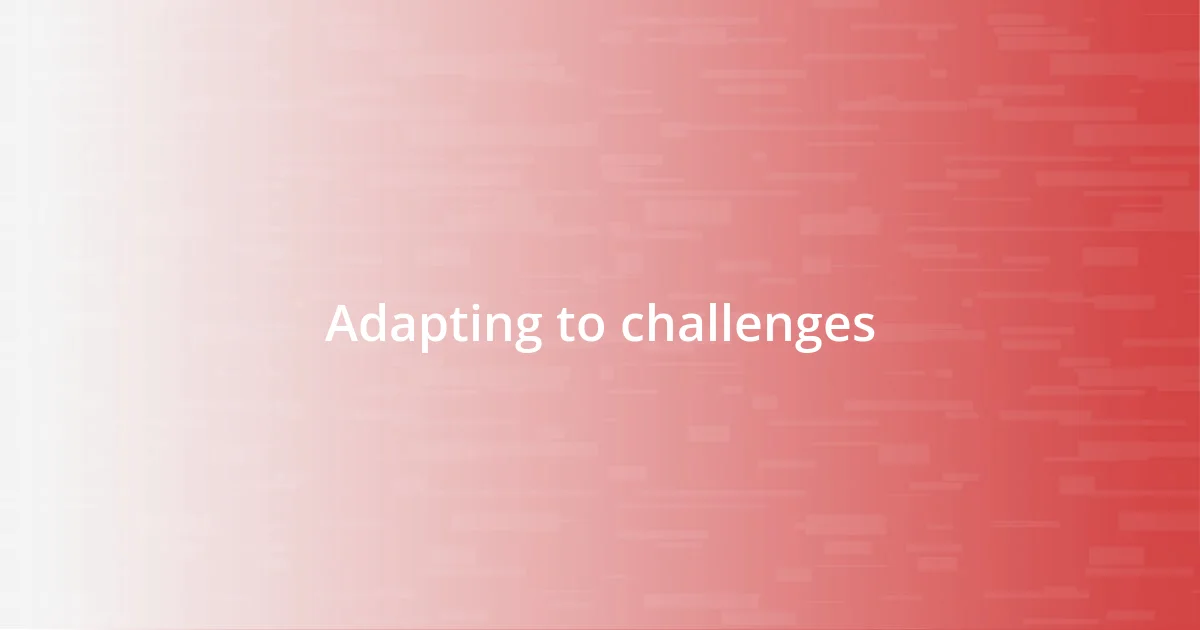
Adapting to challenges
Adapting to challenges is a skill I’ve honed over time, and it wasn’t always easy. For instance, there was a time when I faced pushback on a vital initiative I was leading. At first, I felt disheartened, questioning my approach. However, instead of retreating, I chose to pivot. I sought feedback from my support network and discovered alternative strategies that aligned with my vision while addressing the stakeholders’ concerns. This experience taught me that flexibility is not just about changing tactics; it’s about maintaining the core of what you believe in while remaining open to new pathways.
Another instance that stands out is when I encountered significant setbacks during a campaign launch. I had dedicated countless hours and resources, yet the response was lukewarm. It was tempting to see this as a failure, but instead, I delved into understanding the root causes. Perhaps I hadn’t fully grasped my audience’s needs? By adapting my messaging and seeking their input, I was able to turn a disappointing launch into an opportunity for collaboration and growth. I’ve learned that each challenge can reveal hidden insights if we’re willing to adapt and learn from them.
Sometimes, I remind myself that resilience is like muscle memory. Just as athletes adjust to different conditions in their sport, I’ve trained myself to adapt my mindset when faced with advocacy hurdles. One rainy day during a vital community event, for instance, we had to relocate due to unforeseen circumstances. Rather than succumbing to frustration, I rallied the team to make the environment more intimate, harnessing the unpredictable nature to create a cozy setting. This shift not only salvaged the event but also brought our community closer together. Have you ever found that adapting to the unexpected can lead to even better outcomes than planned? I truly believe that every obstacle carries the seed of opportunity, waiting for us to nurture it.
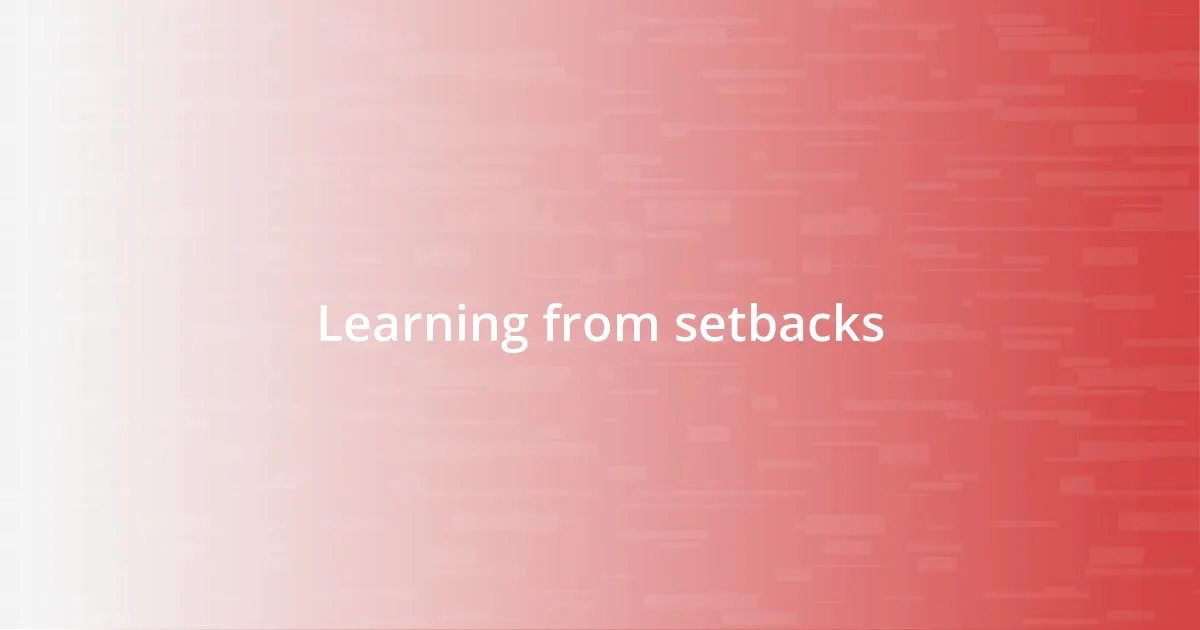
Learning from setbacks
Experiencing setbacks is an inevitable part of advocacy, and I’ve learned to view them through a different lens. I remember a particular moment when my proposal for community reform was rejected at a city council meeting. Instead of seeing it as a failure, I felt an urge to find the silver lining. Reflecting on that experience taught me not just what went wrong, but what I could do differently moving forward. It’s amazing how a shift in perspective can transform frustration into a learning opportunity.
One time, I had the opportunity to present at a conference, and I was so excited until technical difficulties completely derailed my presentation. At first, I felt exposed and vulnerable—like my credibility was at stake. But rather than dwell on the setback, I embraced the moment. I engaged the audience by asking for their thoughts and creating a dialogue. That unplanned interaction not only salvaged the moment but deepened my connection with the attendees. Have you ever had a setback turn into a surprising opportunity? It’s moments like that which remind me of the power of adaptability.
Setbacks can also stir up a whirlwind of emotions, and I’ve found it crucial to sit with those feelings rather than push them away. Once, after a project I was passionate about didn’t receive the funding we expected, I ended up feeling completely defeated. But after reflecting on my disappointment and discussing it with my peers, I realized that this setback was a chance to learn more about grant writing and the intricacies of what attracts funding. Sharing those insights with others not only helped me process my feelings but also strengthened our community’s collective knowledge. Isn’t it fascinating how setbacks can foster growth when we choose to embrace them?
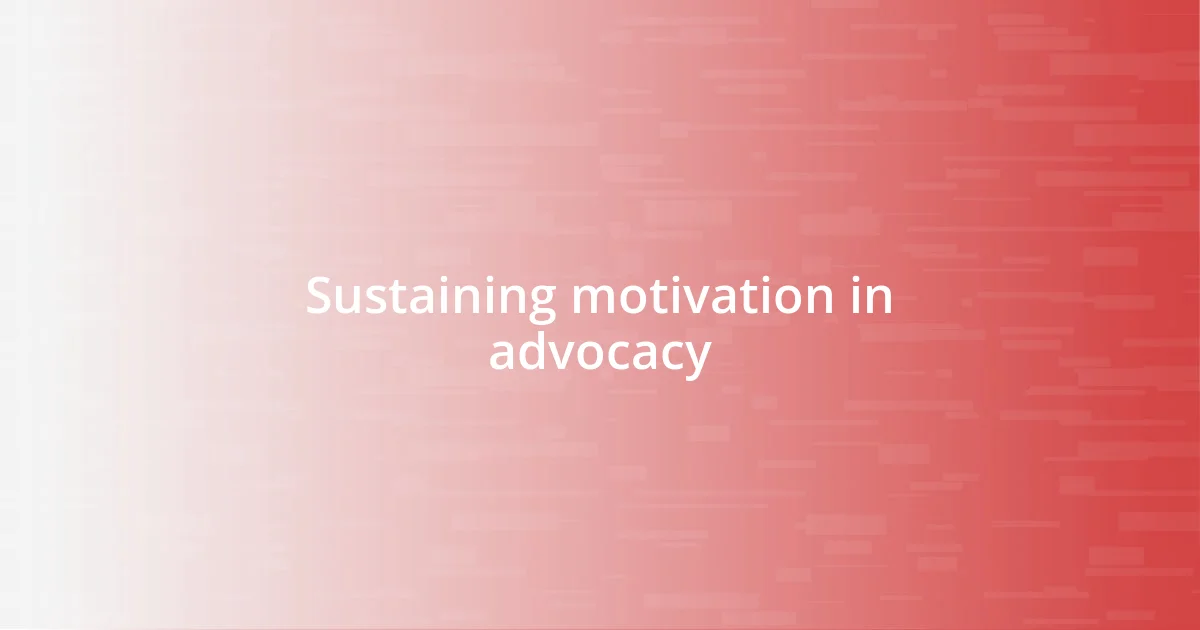
Sustaining motivation in advocacy
Sustaining motivation in advocacy often revolves around the relationships we build. I’ve found that surrounding myself with passionate individuals provides a constant source of inspiration. There was a time when a close colleague and I faced a particularly tough legislative battle, and during our low moments, we’d reminisce about why we started. Those conversations reignited our purpose and commitment. Have you ever experienced a moment where someone else’s enthusiasm reinvigorated your own drive? For me, those shared connections are critical lifelines that keep my passion alive.
Moreover, setting small, achievable goals can make a significant impact. I remember launching a series of community workshops with the aim of raising awareness about a pressing issue. Initially, the big picture felt overwhelming, but breaking it down into smaller milestones kept us focused and motivated. Each time we hit a target, whether it was securing a venue or attracting attendees, it felt like a mini-celebration. These wins reinforced our sense of accomplishment, energizing us to tackle the next challenge. Have you noticed how celebrating small victories can uplift your spirit amid larger struggles?
Lastly, self-care plays a remarkably important role in maintaining motivation. I’ve been guilty of burning the candle at both ends, only to find myself drained and uninspired. A few months back, I took a weekend to unplug from everything—no emails, no meetings, just time for myself. It was during these moments of quiet reflection that I recognized how vital it is to recharge. From that experience, I learned that taking a step back can actually propel us forward with renewed zeal. Isn’t it interesting how sometimes the best way to sustain motivation is to simply give ourselves permission to rest?

